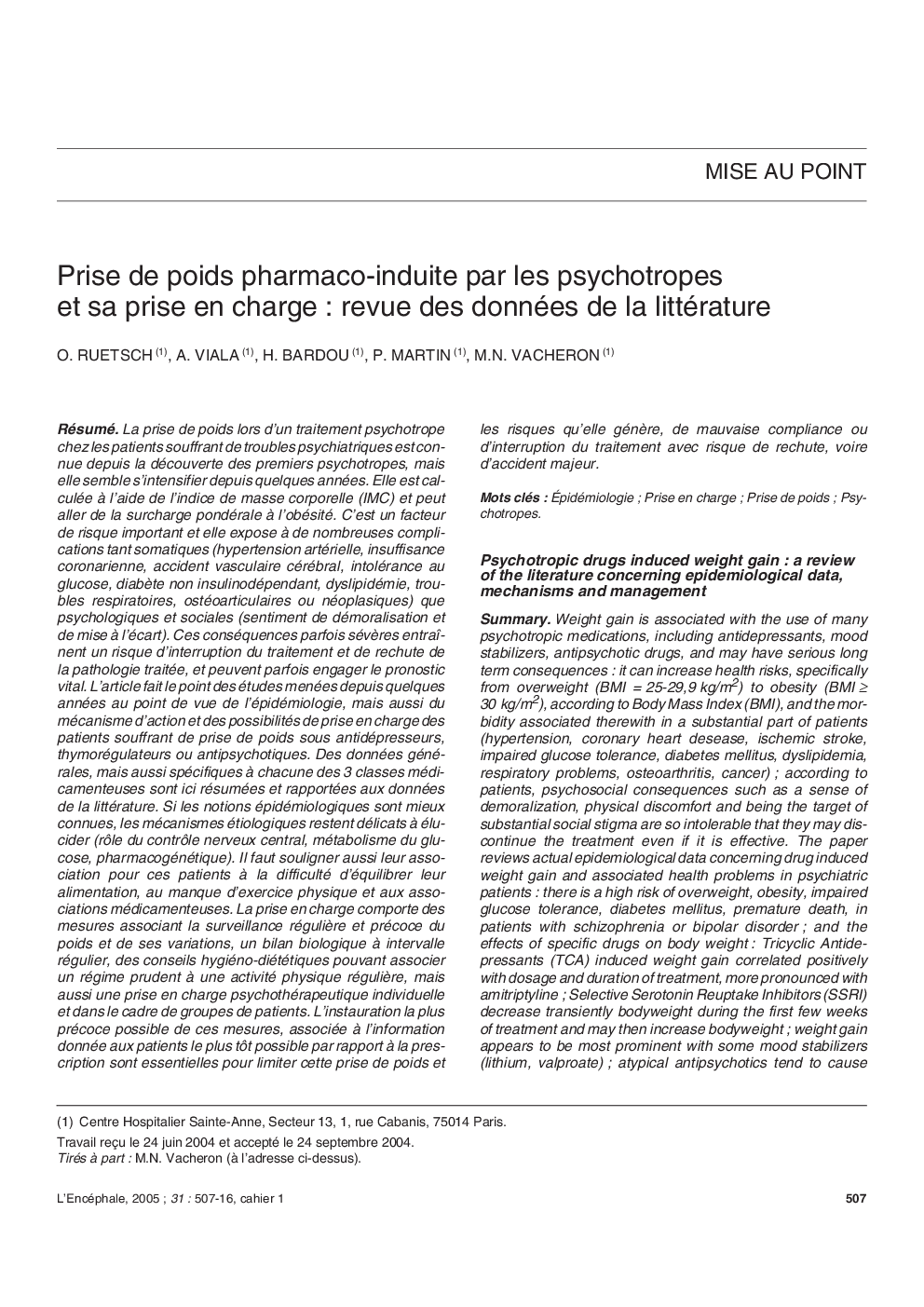| کد مقاله | کد نشریه | سال انتشار | مقاله انگلیسی | نسخه تمام متن |
|---|---|---|---|---|
| 9379579 | 1277262 | 2005 | 10 صفحه PDF | دانلود رایگان |
عنوان انگلیسی مقاله ISI
Prise de poids pharmaco-induite par les psychotropes et sa prise en charge : revue des données de la littérature
دانلود مقاله + سفارش ترجمه
دانلود مقاله ISI انگلیسی
رایگان برای ایرانیان
کلمات کلیدی
موضوعات مرتبط
علوم پزشکی و سلامت
پزشکی و دندانپزشکی
روانپزشکی و بهداشت روانی
پیش نمایش صفحه اول مقاله

چکیده انگلیسی
Weight gain is associated with the use of many psychotropic medications, including antidepressants, mood stabilizers, antipsychotic drugs, and may have serious long term consequences : it can increase health risks, specifically from overweight (BMI = 25-29,9 kg/m2) to obesity (BMI30 kg/m2), according to Body Mass Index (BMI), and the morbidity associated therewith in a substantial part of patients (hypertension, coronary heart desease, ischemic stroke, impaired glucose tolerance, diabetes mellitus, dyslipidemia, respiratory problems, osteoarthritis, cancer) ; according to patients, psychosocial consequences such as a sense of demoralization, physical discomfort and being the target of substantial social stigma are so intolerable that they may discontinue the treatment even if it is effective. The paper reviews actual epidemiological data concerning drug induced weight gain and associated health problems in psychiatric patients : there is a high risk of overweight, obesity, impaired glucose tolerance, diabetes mellitus, premature death, in patients with schizophrenia or bipolar disorder ; and the effects of specific drugs on body weight : Tricyclic Antidepressants (TCA) induced weight gain correlated positively with dosage and duration of treatment, more pronounced with amitriptyline ; Selective Serotonin Reuptake Inhibitors (SSRI) decrease transiently bodyweight during the first few weeks of treatment and may then increase bodyweight ; weight gain appears to be most prominent with some mood stabilizers (lithium, valproate) ; atypical antipsychotics tend to cause more weight gain than conventional ones and weight gain, diabetes, dyslipidemia, seem to be most severe with clozapine and olanzapine. Concerning the underlying mechanisms of drug induced weight gain, medications might interfere with central nervous functions regulating energy balance ; patients report about : increase of appetite for sweet and fatty foods or « food craving » (antidepressants, mood stabilizers, antipsychotic drugs) and weight gain despite reduced appetite which can be explained by an altered resting metabolic rate (TCA, SSRI, Monoaminoxidase Inhibitors MAO I). According to current concepts, appetite and feeding are regulated by a complex of neurotransmitters, neuromodulators, cytokines and hormones interacting with the hypothalamus, including the leptin and the tumor necrosis factor system. The pharmacologic mechanisms underlying weight gain are presently poorly understood : maybe the different activities at some receptor systems may induce it, but also genetic predisposition. Understanding of the metabolic consequences of psychotropic drugs (weight gain, diabetes, dyslipidemia) is essential : the insulin like effect of lithium is known ; treatment with antipsychotic medications increases the risk of impaired glucose tolerance and diabetes mellitus. Several management options of weight gain are available from choosing or switching to another drug, dietary advices, increasing physical activities, behavioural treatment, but the best approach seems to attempt to prevent the weight gain : patients beginning maintenance therapy should be informed of that risk, and nutritional assessment and counselling should be a routine part of treatment management, associated with monitoring of weight, BMI, blood pressure, biological parameters (baseline and three months monitoring of fasting glucose level, fasting cholesterol and triglyceride levels, glycosylated haemoglobin). Psychiatrics must pay attention to concomitant medications and individual factors underlying overweight and obesity. Weight gain has been described since the discovery and the use of the first psychotropic drugs, but seems to intensify with especially some of the second generation antipsychotic medications ; understanding of the side effects of psychotropic drugs, including their metabolic consequences (weight gain, diabetes, dyslipidemia) is essential for the psychiatrics to avoid on the one hand a risk of lack of compliance, a discontinuation of the pharmacological medication and also a risk of relapse and rehospitalization, and on the other hand to avoid acute life threatening events (diabetic ketoacidocetosis and non ketotic hyperosmolar coma, long term risk complications of diabetes and overweight).
ناشر
Database: Elsevier - ScienceDirect (ساینس دایرکت)
Journal: L'Encéphale - Volume 31, Issue 4, September 2005, Pages 507-516
Journal: L'Encéphale - Volume 31, Issue 4, September 2005, Pages 507-516
نویسندگان
O. Ruetsch, A. Viala, H. Bardou, P. Martin, M.N. Vacheron,